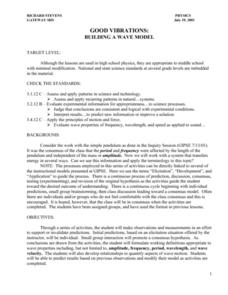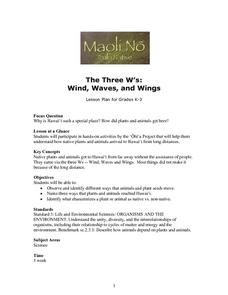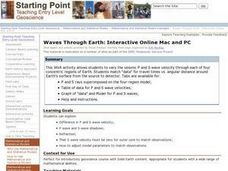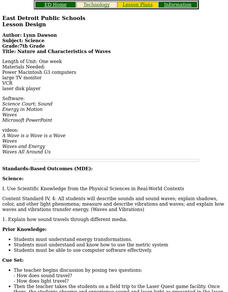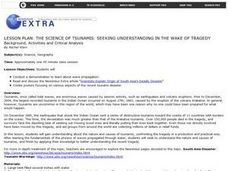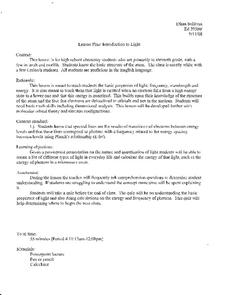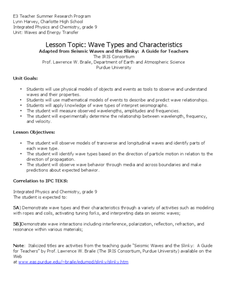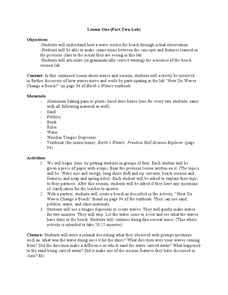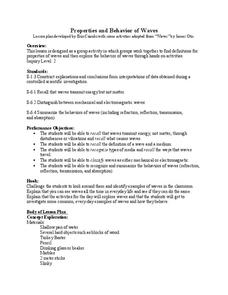Curated OER
Beach Profiling
Pupils explore waves, winds and their effect upon the shape of the beach. They participate in hands-on observations and take measurements along the beach to create a profile of its appearance. Students record their observations, create a...
Curated OER
Hold Off on the Headphones
Learners determine that waves carry energy and information from one place to another. They determine that wavelength, frequency and wave speed are related and describe that sound is a longitudinal wave whose speed depends on the...
Curated OER
Good Vibrations: Building a Wave Model
Students assess and apply recurring patterns in natural systems. They evaluate the wave properties of frequency, wavelength, and speed as applied to sound. Students develop a relationship to quantify aspects of wave motion. They predict...
Curated OER
"Why Is the Sky Blue?"
Learners investigate why the sky is blue and the sunset is red. They are asked why do you think that we see the sky as blue? Students write a hypothesis on their "Blue Sky Lab Sheet". They explain why they think that the sky is blue...
Curated OER
Wave Properties
Students identify how waves transfer energy without transferring matter. They contrast transverse and compressional waves and relate wave speed, wavelength, amplitude and frequency. Lesson includes PowerPoint presentation.
Curated OER
Obtain a visible spectra of chlorophyll a
Students become familiar with the concept of spectroscopy or the study of the interaction of matter with electromagnetic radiation. They prepare solutions and measure absorbance at different wavelengths. Pupils comprehend that mater and...
Curated OER
The Three W's: Wind, Waves, and Wings
Students participate in hands-on acticities to understand how native plants and animals arrived on Hawaii from long distances without the assistance of man. They then identify what characterizes a plant or animal as native vs. non-native.
Curated OER
Waves Through Earth: Interactive Online Mac and PC
Students participate in a JAVA activity to vary the seismic P and S wave velocity through each of four concentric regions of Earth. They match "data" for travel times vs. angular distance around Earth's surface from the source to detector.
Curated OER
Let the Sunshine in
Students collect and analyze data to study wavelengths of visible light. They cover Styrofoam cups with three different colors of sun filtering products and shine a lamp directly on the cups. They determine the most effective filtering...
Curated OER
Wave Equations
Students manipulate a model of a wave in order to solve the wave equation in 1 dimension. By using a model of a wave on a string the student is able to change the tension, length, and mass of the string as well as fix either end of the...
Curated OER
Tuned in: Tuning Forks and Sine waves
Students explore the characteristics of a pure sound wave produced by a tuning fork. They use sine waves to find a curve to fit the sound wave data produced by the tuning fork. A CBL and microphone is required for this activity.
Curated OER
How to verify the relationship between the wavelength and frequency of light
Students collaborate in heterogeneous groups with each student having a different role. They comprehend the relationship between the frequency and wavelength of light. They record their observations in a table that is included on this...
Curated OER
My Flag for the Future
Students study the logo or crest that represents their hometown and describe what it means. They create a new logo for the younger members of their hometown after looking at images of symbols from many other cities and towns.
Curated OER
Wave Erosion Lesson
Fourth graders examine the effects of waves as they erode coastal land. They discover how the power of water can change the appearance of land formations.
Curated OER
Properties of Waves
Third graders observe and investigate wave properties and compare the properties of particles and waves. They fill a pie pan half full with water, place a toothpick in the center of the pie pan, then drop a marble into the pan and...
Curated OER
Nature and Characteristics of Waves
Seventh graders research different types of waves, identify the parts of a wave and create a Power Point presentation demonstrating what they have learned.
Curated OER
Electric Circuits
Students model the flow of electrons in a circuit, draw diagrams of an electric circuit and build an electric circuit. Students explain how to tell when the path of an electric circuit is complete, and test the conductivity of a variety...
Curated OER
Wonderful Waves - Wave Model
Students demonstrate that simple models can be used to represent real world objects that are not easily brought into a classroom. They create a wave model using two different types of simple models.
Curated OER
The Science of Tsunamis: Seeking Understanding in the Wake of Tragedy
Learners use Internet research, articles, discussion and models to explore the dynamics of a tsunami. They focus on the 2004 Asian Tsunami and create posters illustrating their understanding of this phenomenon.
Curated OER
Make Waves
Sixth graders discover, through exploration, the basic characteristics of waves. After a lecture/demo, 6th graders work in groups and participate in a series of labs where they investigate waves. Each group presents its findings to the...
Curated OER
Introduction to Light
Learners study the basic structure of the atom. In this chemistry instructional activity, students explain how colors relate to energy that electrons emit. They calculate energy of the emitted photons.
Curated OER
Wave Types and Characteristics
Ninth graders identify the different parts of a wave. In this physics lesson, 9th graders observe wave behavior as it travels through a boundary. They determine the relationship between wavelength, frequency and velocity.
Curated OER
How Do Waves Change a Beach?
Students conduct an experiment on beach erosion. In this earth science lesson, students create a beach model and use tongue depressor to produce waves. They write a journal about their observations.
Curated OER
Properties and Behavior of Waves
Young scholars explore the different properties of waves. In this physics lesson, students differentiate mechanical and electromagnetic waves. They explore each lab station and write their observation about the wave behavior they see.




